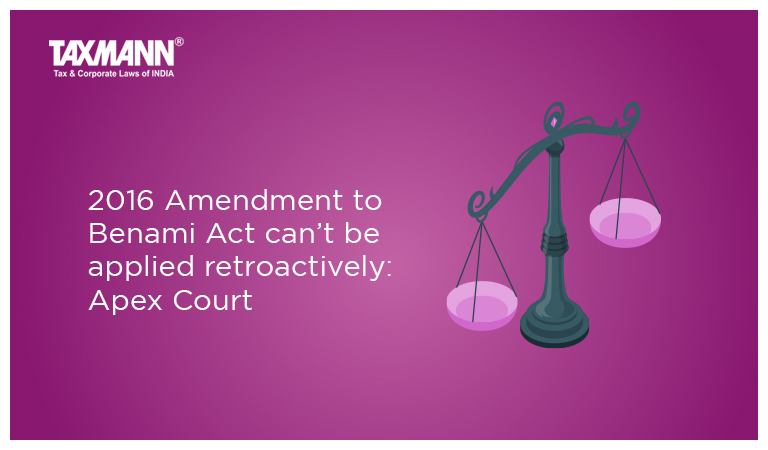2016 Amendment to Benami Act can’t be applied retroactively: Apex Court
- Blog|News|Income Tax|
- 2 Min Read
- By Taxmann
- |
- Last Updated on 25 August, 2022

Case Details: Union of India v. Ganpati Dealcom (P.) Ltd. - [2022] 141 taxmann.com 389 (SC)
Judiciary and Counsel Details
-
- N.V. Ramana, CJI, Krishna Murari & Hima Kohli, JJ.
Facts of the Case
The issue before the Supreme Court was:
“Whether the Prohibition of Benami Property Transactions Act, 1988 [1988 Act], as amended by the Benami Transactions (Prohibition) Amendment Act, 2016 [2016 Act] has a prospective effect”
Supreme Court Held
The Supreme Court held that the main thrust of the argument put forth by the Union of India was that the amended 2016 Act only clarified the 1988 Act. The 1988 Act had already created substantial law for criminalizing the offense and the 2016 amendments were merely clarificatory and procedural, to give effect to the 1988 Act.
The court held that the criminal provisions under the un-amended 1988 Act were arbitrary and incapable of application. Thus, the law through the 2016 amendment couldn’t retroactively apply for confiscation of those transactions entered into between 5-9-1988 to 25-10-2016 as the same would tantamount to punitive punishment, in the absence of any other form of punishment.
It was in this unique circumstance that confiscation contemplated under the period between 5-9-1988 and 25-10-2016 would characterize itself as punitive if such confiscation is allowed retroactively. Usually, when confiscation is enforced retroactively, the logical reason for accepting such an action would be that the continuation of such property or instrument, would be dangerous for the community to be left free in the circulation.
When we come to the present enactment, history points to a different story wherein Benami transactions were an accepted form of holding in our country. The Privy Council had, at one point of time, praised the sui generis evolution of the doctrine of trust in Indian law.
The response by the Government and the Law Commission to curb benami transactions was also not sufficient as it was conceded before this Court that Sections 3 and 5 of the 1988 Act in reality, dehors the legality, remained only on paper, and were never implemented on the ground. Any attempt by the legislature to impose such restrictions retroactively would no doubt be susceptible to prohibitions under Article 20(1) of the Constitution.
Looked at from a different angle, the continuation of only the civil provisions under Section 4, etc., would mean that the legislative intent was to ensure that the ostensible owner would continue to have full ownership over the property, without allowing the real owner to interfere with the rights of benamidar.
If that is the case, then without effective enforcement proceedings for a long span of time, the rights that have crystallized since 1988, would be in jeopardy. Such implied intrusion into the right to property cannot be permitted to operate retroactively, as that would be unduly harsh and arbitrary.
Disclaimer: The content/information published on the website is only for general information of the user and shall not be construed as legal advice. While the Taxmann has exercised reasonable efforts to ensure the veracity of information/content published, Taxmann shall be under no liability in any manner whatsoever for incorrect information, if any.

Taxmann Publications has a dedicated in-house Research & Editorial Team. This team consists of a team of Chartered Accountants, Company Secretaries, and Lawyers. This team works under the guidance and supervision of editor-in-chief Mr Rakesh Bhargava.
The Research and Editorial Team is responsible for developing reliable and accurate content for the readers. The team follows the six-sigma approach to achieve the benchmark of zero error in its publications and research platforms. The team ensures that the following publication guidelines are thoroughly followed while developing the content:
- The statutory material is obtained only from the authorized and reliable sources
- All the latest developments in the judicial and legislative fields are covered
- Prepare the analytical write-ups on current, controversial, and important issues to help the readers to understand the concept and its implications
- Every content published by Taxmann is complete, accurate and lucid
- All evidence-based statements are supported with proper reference to Section, Circular No., Notification No. or citations
- The golden rules of grammar, style and consistency are thoroughly followed
- Font and size that’s easy to read and remain consistent across all imprint and digital publications are applied



 CA | CS | CMA
CA | CS | CMA
